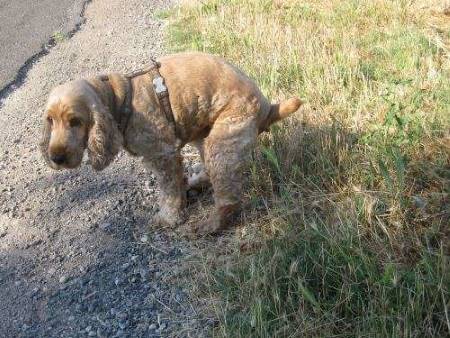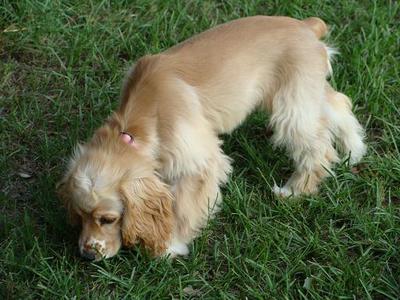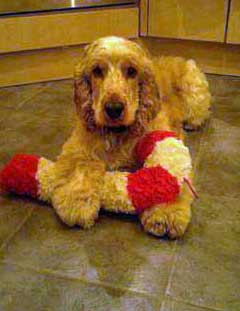- Home
- Cocker Spaniel Health Issues
- Constipation in dogs
Constipation In Dogs
Constipation in dogs (just like in humans) can be very uncomfortable and in some cases, painful. If you have a constipated canine, read on to learn all you need to know about; what causes it, how to treat it, and how to get your Cocker Spaniel 'moving' again.
Constipation in Dogs & Puppies
 Nothing's happening Mum!
Nothing's happening Mum!If your dog is constipated his poo will be dry and hard, which will make it very difficult for him to poop normally, if at all.
Constipation in puppies and dogs is common but it can be extremely unpleasant and can make your pet's life a real misery.
The longer your pet is unable to poop, the worse his 'condition' will become.
So it's up to us (as loving Cocker owners) to know when our dog is constipated and to understand what we need to do to make him better again.
What are the Symptoms of Canine Constipation?
Symptoms of constipation in dogs are fairly easy to spot.
If your dog hasn't pooped for a couple of days or his poop is very hard and pebble-like, then your Cocker Spaniel is probably constipated!
Another sure sign is squatting and straining for ages, without producing any results. I've watched Max strain so much he's almost done a hand-stand!
The longer your dog remains constipated, the worse the problem will become and he'll soon begin to feel quite 'yucky'.
He may lose his appetite and seem generally unwell and miserable.
Your Cocker Spaniel may also appear restless or lethargic and show a distinct lack of interest in anything that's going on around him.
What Causes Constipation in Dogs?
There are many things that can cause constipation in dogs and puppies, but generally the most common culprits are set out below.
A Poor Diet
A poor diet can cause constipation in dogs, especially if it contains too many carbohydrates, insufficient moisture, and is low in fibre and essential oils.
A healthy balanced diet is necessary to keep your Cocker's digestive system healthy.
Not Drinking Enough Water
Dehydration can cause constipation in dogs.
The longer the poop stays in your pet's intestines, the more moisture it loses and the dryer it becomes, thus compounding the problem.
Not Enough Exercise
 I can't poop Mom!
I can't poop Mom!Insufficient exercise will produce a sluggish digestion.
Just as it is with humans, exercise is vital for digestive health and for keeping things moving, literally!
A Medical Problem
There are lots of medical problems that can contribute to, if not cause, constipation in dogs, such as kidney disease or prostrate problems.
It's important to be sure that your dog's constipation isn't anything more sinister than constipation. If it lasts any longer than a few days, or he displays any unusual symptoms, take him to see his vet.
Stress & Trauma
Stress can often cause your pet to become constipated. For example, moving home, a new addition to the family, a stay in kennels, etc. can all contribute to the problem.
The trauma of having surgery and anaesthetic can also cause constipation in dogs.
Medication
There are many medications that can cause our dogs to become constipated.
If your Cocker is taking medication and you suspect it may be causing his constipation, ask your vet if there is an alternative medication that you can try.
Internal blockage
What goes easily into your dog's mouth doesn't always come out of the other end as easily!
It very much depends on what he's eaten and/or swallowed recently!
Being curious creatures, (not to mention always being hungry) your Cocker Spaniel may also eat bones, stones, grass, laces, slippers, newspapers. The list is almost endless.
If your pet accidentally swallows something small and indigestible, such as a plastic toy, it could get stuck inside his intestines and cause a blockage.
Most of the time your dog's digestive system manages to expel these 'foreign' bodies, however if they do cause a blockage, it can be quite serious and very definitely should be referred to your vet.
Your Cocker may have a blockage in his intestines where his constipation has lasted more than a few days.
Treatment of Constipation in Dogs
Simple constipation in dogs and puppies isn't too serious a problem and can often be treated easily at home.
If you have a constipated dog or puppy, here are a few ideas to help get things moving again.
Increase The Fibre In Your Dog's Diet
A healthy diet rich in fibre will help to keep your Cocker Spaniel's digestive system working at its best and will help to keep his poop on the move, literally!
Fruit & Vegetables
Fresh vegetables, especially leafy greens, will add lots of fibre to your dog's diet.
You may like to consider putting your dog on a vegetarian diet for a little while to ensure he gets lots of fibre and natural goodness into his body. If you'd prefer not to, you could simply increase his vegetable (and fibre) intake.
Max enjoys raw red pepper and carrot, but will only eat carrot batons if they're slightly blanched first. He won't eat them raw!
I also supplement his diet with an occasional handful of green beans (which he loves) and a little broccoli.
Courgettes are another of his favourites.
As well as being full of fibre, courgettes can also be used to help your dog lose weight.
When I think Max is looking a bit on the chubby side, I substitute courgette for a third of his meals (morning and night) for around 4 days.
It really works and it won't harm him. My vet swears by it, and so do I!
I simply slice and dice the courgettes, throw them into a bowl and microwave them for around 4 minutes. How easy is that?
Fruit
If your dog enjoys pear or apple, you can add a little of each to his diet, just remember to remove the pips first as they can be harmful.
Pumpkin
Tip: Replace your Cocker's dog treats, which can often cause constipation, with strips of raw vegetables to help to increase his fibre intake.
If you can get it, tinned pumpkin or squash (sugar free) can work wonders for a constipated dog or puppy. It's packed full of fibre and in tins or jars, it's very convenient to use.
I don't think you can buy it in tins in the UK, but freshly cooked pumpkin or squash is just as good and offers just as much fibre. You may be able to buy it frozen in chunks.
Pumpkin is packed choc-full of fibre. Two tablespoons of pureed pumpkin per day added to your dog's food should do the trick!
Oatmeal & Bran
Adding oatmeal, bran flakes or 'all' bran to your pet's diet will also boost his fibre levels, which will help to soften his stool.
Mix a tablespoon of bran in with his food for a few days. Increase the dose if you don't see any results on the first day. Conversely, reduce it if his stool becomes too loose.
Milk Can Help With Constipation In Dogs
I usually advise against giving your Cocker Spaniel milk because it's difficult to digest and the lactose in the milk can have a laxative effect on your dog, however in this case it may just be the ticket.
Try giving him 3 tablespoons of milk twice a day for 2-3 days.
Olive Oil/Mineral Oil
Adding a tablespoon of olive oil or vegetable oil to your Cocker's food can help to cure constipation in dogs.
Personally, I would use olive oil as it's more natural, but it's your choice.
Either of these oils will help to give your dog a healthy digestive system as well as give him a lovely shiny coat and good skin.
Other Remedies for Dog Constipation
I have heard of other remedies use for constipation in dogs, but I have never tried any of these so I'm not really in a position to recommend them, however, here they are.
- Psyllium husk powder
- Ginger and chicken or beef stock
- Coconut fibre
- Coconut oil
- Mineral oil
- Milk of magnesia
- Laxatives
I strongly recommend that you speak to your vet before you use any of the above, especially if you're considering using laxatives.
Dog Constipation Remedies: A Word of Caution!
Don't try all of the above at the same time; try only one at a time.
If your dog is constipated for any longer than 3-4 days and you've tried some of the above suggested remedies (and they've not worked) it would probably be a good idea to have a chat with your vet.
There are many health problems that can cause constipation in dogs, for example, problems with the anal glands, canine bloat, worms, kidney problems, an enlarged prostrate gland, or a cancerous tumour blocking the colon.
If your Cocker begins to display any symptoms that worry you, or he becomes unwell, it's advisable to stop any home remedies and take your pet to see his vet immediately.
If your dog's constipation is the result of an underlying health problem, your vet will be able to make an accurate diagnosis and begin immediate treatment.
Preventing Constipation in Dogs
There are many things you can do to help prevent constipation occurring in the first place.
A Healthy Diet Rich in Fibre
The first step to preventing canine constipation is a good diet.
A healthy diet rich in fibre will help to keep your Cocker Spaniel's digestive system working at its best and will help to keep his poop on the move, literally!
Stick to the same high quality dog food that you normally feed him and keep your pet away from all processed human foods.
Certain Foods Can Cause Constipation in Dogs
Did you know that certain foods can cause constipation in dogs?
For example, too many rawhide chew bones or treats, animal bones and too much protein in your dog's diet can all have an effect.
Excessive Self-Grooming
Believe it or not, even dog hairs can cause constipation!
Please let me explain.
Excessive grooming and licking can cause dog hair to build up in the intestines and eventually block or slow down the digestive transit, resulting in constipation.
Shedding in Cocker Spaniels seems to vary from dog to dog.
Max hardly sheds at all (thankfully!) however, one of his buddies sheds quite a lot and (unfortunately) also suffers from all sorts of allergies. He's always licking his fur at an attempt to get at his skin.
This hair ends up getting trapped in his colon and has in the past caused a blockage resulting in severe constipation.
Worth knowing, don't you think?
Keep Your Cocker Hydrated
Dehydration can also cause constipation in dogs.
Be sure your dog has lots of fresh water to drink. This is especially important if he's fed on kibble because it has very limited water content.
When the weather is very hot, check his water bowl twice daily.
The longer the poop stays in your pet's intestines, the more moisture it loses and the dryer it becomes, thus compounding the problem.
Feed Him Tinned Dog Food For A While
Tinned dog food contains lots of water.
If you normally feed your Cocker Spaniel on dry kibble, feeding him tinned dog food (the most expensive you can afford) for a couple of days will help to raise the moisture levels in his gut.
Give Your Dog Additional Exercise
Making sure your Cocker Spaniel has lots of exercise will help to stimulate his bowels.
Take him for long walks, throw him a ball or a Frisbee, but get him running.
If he enjoys swimming, take him to the seaside or somewhere he can swim.
Just as with us humans, exercise is vital to get your dog's bowels moving.
Keep His Bottom Area Neat & Tidy
Last but not least, if your cockers feathers around his bottom become severely tangled and matted, it could go some way to causing constipation.
I think the matting would need to be pretty serious. However, if it gets to that stage and stops your Cocker from pooping, it will become compacted inside his anus, thus causing constipation.
Keeping this area well groomed and trimmed will help to avoid the problem.
Constipation In Dogs: Conclusion
Don't let your dog's constipation go on for any longer than a few days. If it's heading that way, it could be a sign that the problem is more serious than a simple case of constipation.
Especially so, if your dog seems distressed, is in obvious pain, has vomited or is trying to vomit, or if his tummy is swollen, in which case I recommend you play it safe and speak to your vet immediately.
Visitor Questions: My Dog Is Constipated!
Please help; my Cocker Spaniel dog is constipated!
She has a hard time going #2 sometimes, but it often becomes a real problem. When that happens, she gets so bound up that she is physically ill.
I took her to the vet, who told me she had colitis.
Can you recommend a puppy laxative I can give to her?
Question from: Chris
Sioux, LA. USA
 My Mom says I'm a constipated puppy...whatever that means!
My Mom says I'm a constipated puppy...whatever that means!My Dog is Constipated: Pauline's Answer
Hi Chris,
In dogs, colitis is often mistaken for constipation, so I'm not surprised you thought your dog was constipated.
Natural Remedies for Dog Constipation
I always advocate easing constipation the natural way, without chemical laxatives. If you use nature's laxatives, you won't go wrong.
Here are some natural remedies for dog constipation; you can try a couple and see their effect on your dog.
- Adding bran or a few drops of olive or mineral oil to their food may help to alleviate the symptoms.
- Increasing fresh vegetables (cooked or raw, but raw is better) can also help relieve constipation in dogs (and humans!).
- If you feed your dog kibble, adding a few drops of warm water to moisten the biscuits can also help to alleviate constipation.
- Regular exercise equals regular bowels!
- Make sure your dog has plenty of fresh, clean water.
In short, a healthy diet, with plenty of fresh drinking water and lots of exercise, will help keep your cocker spaniel fit, regular and healthy.
Treating Colitis in Dogs
However, if your vet didn't prescribe a laxative, I wouldn't use one. She probably doesn't need it.
(I'm surprised your vet didn't prescribe something for the inflammation, which is often present in colitis. I can only assume it is a mild condition). Did he recommend any changes to her diet?
Like humans, your pet's diet should be a healthy mix of nutrition: the right balance of protein, carbohydrates, fats, vitamins, minerals and oils.
You can follow this link to learn more about the Cocker Spaniel's diet.
You could ask your vet to recommend something for her or increase her fibre and liquid intake, which will go a long way to ensure she's more 'regular'.
Don't feed your dog junk food (bread, cakes, pizza etc.) because you'll only worsen the situation. (Yes, we're all guilty of occasionally feeding our cockers such table scraps.)
After a week or so, you should see an improvement in your cocker's bowel movements. However, if your puppy's constipation/colitis continues, I'd suggest you go back to your vet and ask him to take another look at her.
Visitor Comments: My Dog is Constipated!
You could feed your dog a little cooked, mashed pumpkin or steamed cabbage leaves, but don't give her too much. Start with a tablespoon mixed with your puppy's food for 3 days.
If nothing happens, increase it to two tablespoons for the next 3 days.
If that doesn't work, try the cabbage in the same doses. You should see results from one of them.
If you don't, you may have to resort to using laxatives, but personally, I wouldn't, at least not without the say-so of your vet.
If you decide to give your pet laxatives, don't give her laxatives meant for humans.
My Dog is Constipated!
Comment By: Seb S
My vet gave him something for the inflamed colon to settle it down. He recommended changing him to a hypoallergenic diet and increasing the fibre in his diet.
I followed his advice, and within a couple of weeks, he was as good as new!
Unfortunately, I couldn't afford to continue feeding him the hypoallergenic dog food, so I had to change him back to his other food.
It's good, but not as good as the hypo food, but I often give him sweet potato or greens mixed with his kibble.
Hope your puppy is better soon.
My Dog is Constipated!
Comment By: Raji
Photo Credits: Constipation in Dogs
1. Copyright of About Cocker Spaniels
2. Visitor photo


